 In the Canada and Bermuda Territory, there is no “one-size-fits-all” approach to training officers. In addition to the standard two-year program at the College for Officer Training (CFOT) in Winnipeg, the Army offers Field-Based Tailored Training (FBTT), which embraces the unique situation of different candidates, offering an alternative path to officership for people who meet certain criteria. FBTT takes into account a candidate's education, experience in ministry and life circumstances, and creates an individualized program that is flexible in content, training methods, length and location. In this article, current cadets share their experience in FBTT.
In the Canada and Bermuda Territory, there is no “one-size-fits-all” approach to training officers. In addition to the standard two-year program at the College for Officer Training (CFOT) in Winnipeg, the Army offers Field-Based Tailored Training (FBTT), which embraces the unique situation of different candidates, offering an alternative path to officership for people who meet certain criteria. FBTT takes into account a candidate's education, experience in ministry and life circumstances, and creates an individualized program that is flexible in content, training methods, length and location. In this article, current cadets share their experience in FBTT.
An Amazing Gift
Cadet Sharon Tidd, New Westminster, B.C.
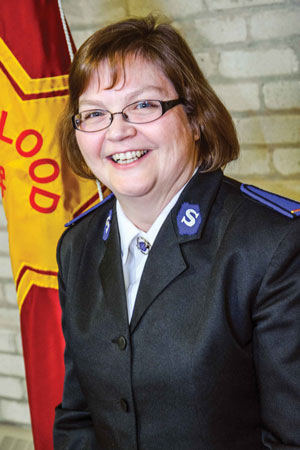 Cadet Sharon Tidd has only been stationed at New Westminster Citadel, B.C., since November, but she already feels right at home.
Cadet Sharon Tidd has only been stationed at New Westminster Citadel, B.C., since November, but she already feels right at home.
“I'm loving it,” she says. “It's a vibrant ministry and the congregation is very involved in outreach. We run a shelter, feeding program, day-care—as well as the usual family services—and there's a lot of visionary thinking on the part of the soldiers.”
The daughter of officers, Cadet Tidd is a lifelong Salvationist. Over the past 26 years, she has worked for the Army in various capacities. Most of that work was administrative, until about five and a half years ago.
“I was working at divisional headquarters in British Columbia when I finally realized that pastoral ministry was what God intended for me to do,” she says, noting that she felt called to ministry in her 20s, but didn't feel ready to pursue that calling at the time.
Before entering the FBTT program last fall, Cadet Tidd was the associate pastor at Kelowna Community Church, B.C.
“I was enjoying the work I was doing but I felt that God was saying, 'It's time to move on,' yet I had no idea what that was going to look like,” she remembers. “I told my corps officers, Majors Ron and Toni Cartmell, that I felt like God wanted me to move into a position that involved more preaching and teaching, and they suggested I consider officership.”
Given Cadet Tidd's background, field-based training was the obvious next step. She not only has experience with pastoral ministry, but also has several years of theological training, including a bachelor of arts in music and biblical studies and a master of divinity.
“I don't think I could have gone back to school full time,” she says. “I'm so glad I didn't have to—the field-based training program is an amazing gift to people like me.”
Bridging the Gap
Cadets Leonard Heng and Peck-Ee Wong, Toronto
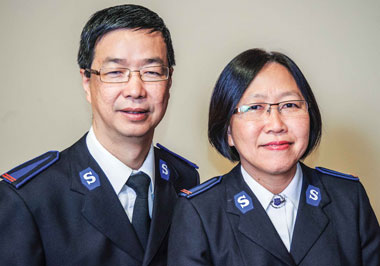 After immigrating to Canada from Singapore seven years ago, Cadet Leonard Heng came to Toronto's Scarborough Citadel looking for opportunities to volunteer. What he and his wife, Cadet Peck-Ee Wong, found there was a new, and unexpected, life path: officership with The Salvation Army.
After immigrating to Canada from Singapore seven years ago, Cadet Leonard Heng came to Toronto's Scarborough Citadel looking for opportunities to volunteer. What he and his wife, Cadet Peck-Ee Wong, found there was a new, and unexpected, life path: officership with The Salvation Army.
Cadets Heng and Wong met at a Baptist seminary in Singapore where they trained to be pastors. After graduation, they spent the next decade in various ministry positions, including four years in China where they served as missionaries in the Hainan province.
They came to Canada seeking better educational possibilities for their children, while also praying for new opportunities to serve God.
In September 2006, Cadet Heng became the multicultural ministries co-ordinator at Scarborough Citadel and, a year later, Cadet Wong took on the position of family services worker. With the encouragement of Major Everett Barrow, then the corps officer there, the couple prayed about the possibility of becoming officers and decided to enter the FBTT program in September 2011. Since then, they have ministered at North Toronto Community Church and Toronto's Agincourt Community Church.
“Being able to stay in Toronto made it much easier to transition into life as cadets in training,” says Cadet Wong. “Our children are teenagers now, so it helps that we didn't have to uproot ourselves.”
“And being in the field means that whatever we learn in class can be applied right away in our ministry,” adds Cadet Heng. “Then we will know whether something will work or not and can make adjustments.”
Outside of their daily ministry, Cadets Heng and Wong appreciate the opportunities they have had to go to CFOT for training and events.
“We have been able to get to know the training staff, understand some of the struggles that our fellow cadets have and be of encouragement to them,” says Cadet Wong. “Even in Toronto, we sometimes have opportunities to take courses with the auxiliary-captains, and we have made good friends there as well.”
Their current ministry is focused on the Chinese population in Agincourt.
“When we came here, I had no idea that our second language, Chinese, would be so useful,” says Cadet Wong. “I'm finding it very meaningful that I am able to help and serve as a bridge between the Chinese people and the corps, because there is definitely a cultural gap—not just a language gap. So I feel like God has placed us here at a very strategic time and I'm really thankful for that.”
Spiritual Formation
Cadet Mark Young, Winnipeg
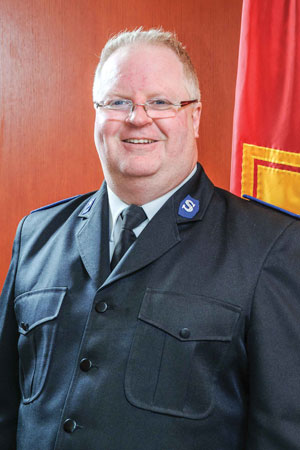 When Cadet Mark Young came to Winnipeg in 1987 to attend Catherine Booth Bible College (now Booth University College), he intended to train to become a Salvation Army officer once he finished his degree. But after he graduated, a position opened up at the local Harbour Light (now Weetamah Corps) and he embraced the opportunity to enter ministry right away.
When Cadet Mark Young came to Winnipeg in 1987 to attend Catherine Booth Bible College (now Booth University College), he intended to train to become a Salvation Army officer once he finished his degree. But after he graduated, a position opened up at the local Harbour Light (now Weetamah Corps) and he embraced the opportunity to enter ministry right away.
Four years ago, when Cadet Young became the ministry leader there, he started earnestly considering officership again. He entered the FBTT program in September 2012.
For Cadet Young, the ability to continue in ministry while completing training requirements has been an important advantage of the program.
“Attending classes has been a wonderful blessing,” he says, adding that the spiritual formation class has been particularly meaningful.
“In one of our first classes, we went on a prayer walk and I ended up in a place where I could just sit, pray and read Scripture,” he shares. “Being in a busy ministry, I sometimes forget to be still with God. So I'm very thankful for that class—it took me back to a place where I needed to be.”
Living in Winnipeg, Cadet Young has also benefited from his proximity to CFOT and his fellow cadets.
“It's a privilege to be able to attend classes and chapels,” he says, “and it's encouraging to know that you're not alone—to have that sense of community. I know not everyone in field-based training has that, so I don't take it for granted.”
In addition to support from CFOT and his fellow cadets, Cadet Young has his family, who are also involved in Salvation Army ministry: his wife, Denise, works at Booth University College while his son is involved in gang outreach and street ministry at Weetamah. This support is crucial for Cadet Young as he meets the challenges of ministry and training.
“It has taken time for me to adjust to having a large ministry while completing my training requirements,” he says. “I can't always attend events at CFOT because I'm involved with my own ministry. But overall, my experience in the field-based training program has been really good.”
God's Divine Timing
Cadets Darryl and Kimberley Burry, Comox Valley, B.C.
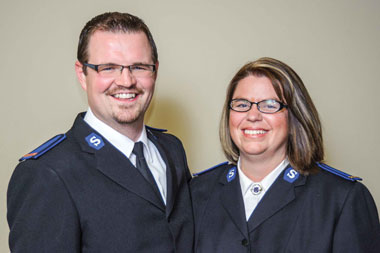 When Cadet Darryl Burry entered the FBTT program in September 2011, he knew it was “God's divine timing.” At that point, he and his wife, Cadet Kimberley Burry, had been serving as corps leaders at Comox Valley Community Church, B.C., for more than three years, following a five-year term as associate pastors at Kelowna Community Church, B.C.
When Cadet Darryl Burry entered the FBTT program in September 2011, he knew it was “God's divine timing.” At that point, he and his wife, Cadet Kimberley Burry, had been serving as corps leaders at Comox Valley Community Church, B.C., for more than three years, following a five-year term as associate pastors at Kelowna Community Church, B.C.
“God has always very clearly laid out where he wanted us to be, when he wanted us to be there,” he says. “When our divisional commander asked us to consider field-based training, we recognized that this was the next step.”
A graduate of Booth University College, Cadet Burry has worked for The Salvation Army for the past 15 years, and both he and his wife are the children of officers.
He says being in the training program has been both a blessing and a challenge.
“It's a blessing in that we've been able to continue in full-time ministry,” he explains. “That has been very helpful—not only for the ministry unit, to have that continuity, but also for our family, to be able to stay here.
“It's a challenge in that there has been significant travel involved to Winnipeg and Toronto for training,” he continues, “but we have been absolutely blessed to have people around us who have supported us. We would not have been able to do it without them.”
Cadet Burry says he is also grateful for the various ways in which the program has been tailored to his background, education and experience.
“The training college staff do a wonderful job of developing a clear picture of what each person needs to ensure that we have the right qualifications to be able to serve in The Salvation Army as an officer,” he says.
For Cadet Burry, this means that his program has focused less on administrative training, and more on Salvation Army theology and pastoral care.
“These are things that we know and have put into practice in our ministry,” he says, “but going back and walking through why we do what we do has reaffirmed that strong foundation.”
Grateful for the doors God has opened for ministry so far, Cadet Burry is looking forward to what comes next after he and his wife are commissioned this spring.
“What's most important is having the understanding that when God does call, there needs to be a surrender,” he says. “And when we do surrender to his will, everything falls into place.
“As challenging as it is sometimes, my wife and I know that what we are doing is in God's will,” he adds, “and he has met every one of our needs throughout this entire journey.”
For more information about the Field-Based Tailored Training program, visit cfot.ca.





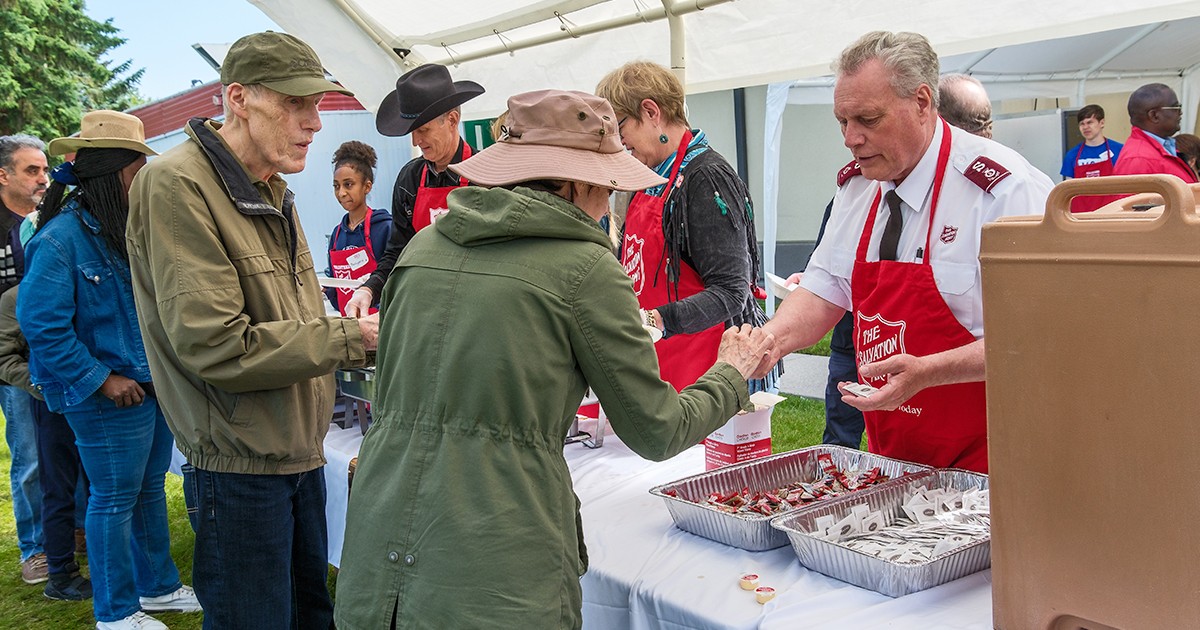
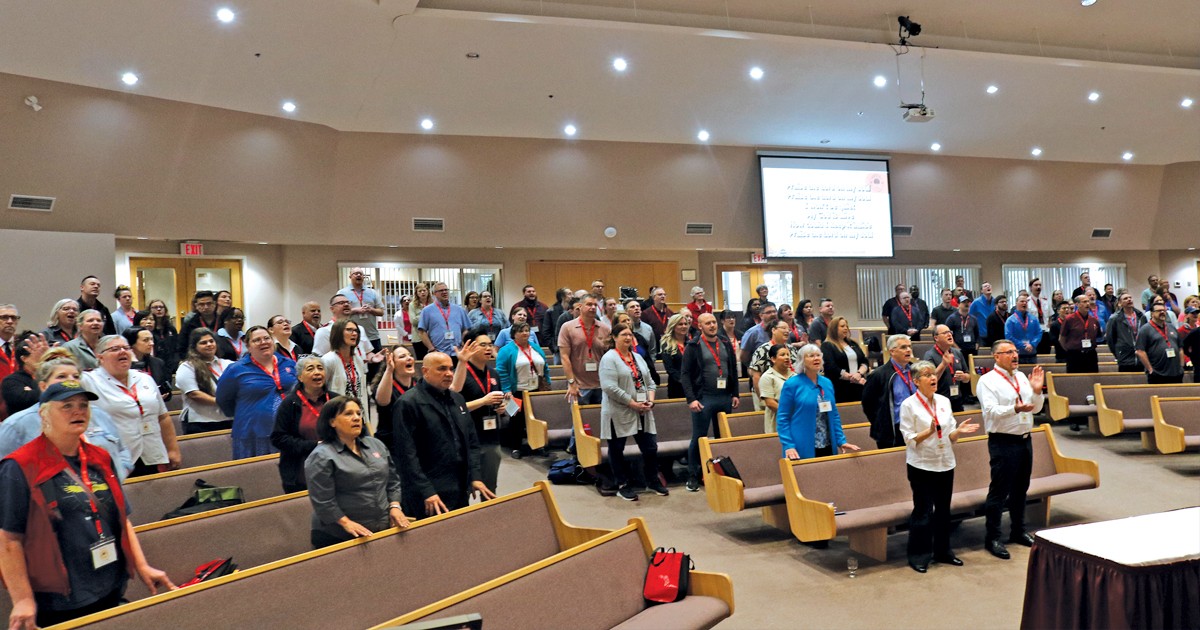
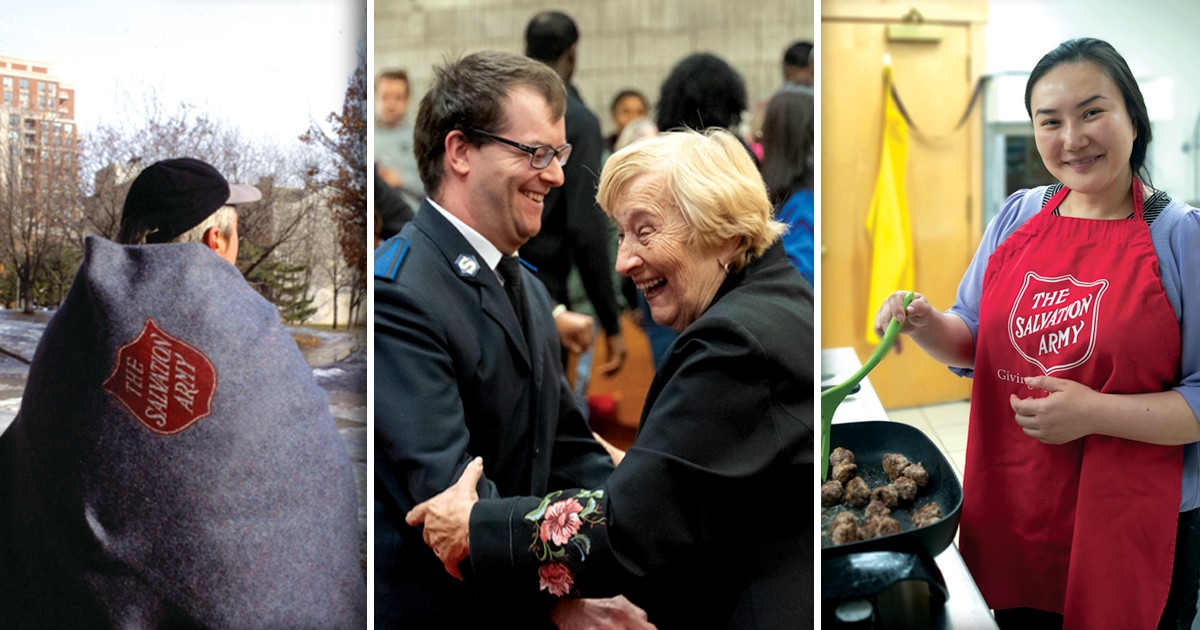


Comment
On Thursday, March 14, 2013, Charlotte Dean said:
Leave a Comment